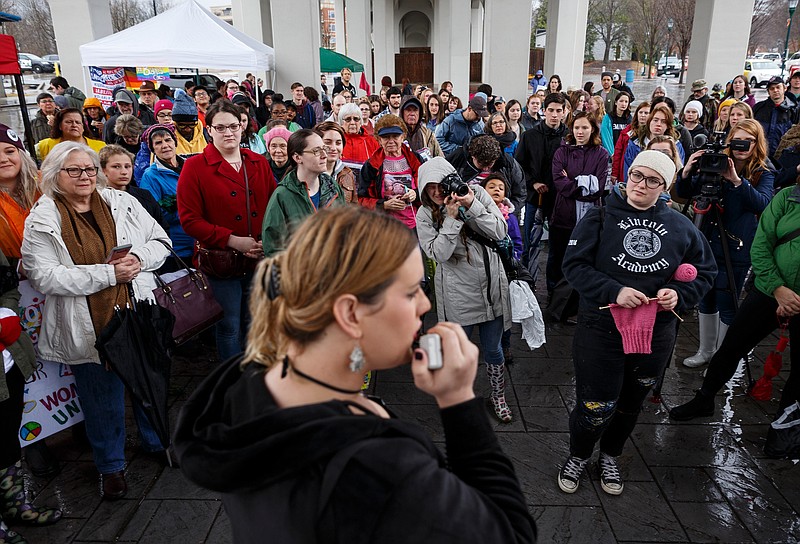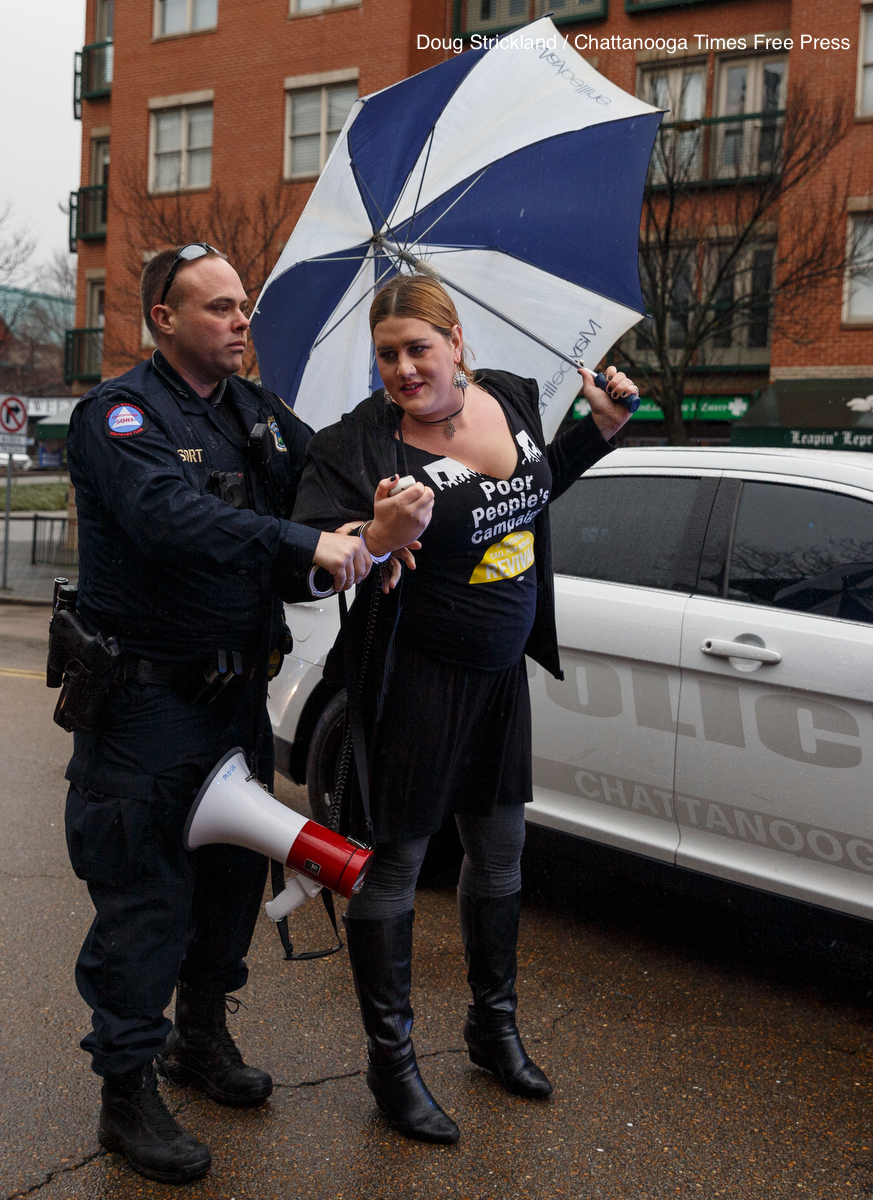Two transgender women who were among the five people arrested Saturday during Chattanooga's women's march say the way one of them was treated at the Hamilton County Jail raises concerns for other members of the LGBTQ community.
The activists were arrested after they blocked city streets without a permit and refused to move.
The Rev. Alaina Cobb and Maddie Boyd-Nix, identified by police as William Nix, said a lack of training or policy for people who are transgender led to Nix, who is a transgender woman, being treated unfairly.
The group was searched, booked and placed in a holding cell where they spent five hours.
But the same didn't happen for Nix, Cobb said.
"I don't know if they just didn't want to touch her, or what, but she was not even searched," Cobb said. " She was just kept off to the side in a lobby, rather than being put with the women or the men."
Hamilton County Sheriff's Office spokesman Matt Lea later clarified that Nix was not in a "lobby," but "was brought to an open seated area, similar to a waiting room, that is located in a secure area within the jail next to the booking and fingerprinting area."
That area serves as temporary holding area where inmates are sometimes held that may not be in the jail for a long period of time, he said.
At any rate, Nix felt singled out.
"There was other prisoners, both on the male and the female side, just walking around and wondering about me because I was more or less getting 'special privilege' by not being put in a jail cell," she said. "It singles people out, and it makes the other prisoners think 'What is wrong with this person?'"
That made Nix feel uncomfortable, she said, and she began to worry about other transgender people who might find themselves in her position.
"What would happen to a transgender woman who was arrested by herself?" Nix said. "How they treated me differently being in my group with my clergy clothing on, versus a trans woman just being arrested [by herself]."
Policies need to be implemented for how to properly ascertain what gender someone identifies as, Cobb said.
"If they can't outwardly identify their gender, that means that people are being punished for not looking female enough or looking male enough," Cobb said. "Not even necessarily for being trans, but just not looking how they decide that you should look."
In a statement, Lea said that transgender individuals are "typically housed with the gender that corresponds to the gender listed on their driver's license."
"With that said, the jail does make every attempt to be sensitive to the person's gender to which they identify at the time of booking," he said.
As for policy, however, it wasn't clear if one exists specifically for LGBTQ inmates.
Lea said "a variety of criteria [is used] to determine what is the best classification for an inmate," meaning where the inmate will be housed.
Some of that criteria includes arrest history, whether the inmate is a threat to themselves or others, flight risk and if the arrestee doesn't get along with other inmates.
Hamilton County assistant attorney Dee Hobbs said Nix wasn't singled out without a valid reason.
"That's just not usually how we're gonna roll here," Hobbs said. "There would be a reason why this individual was classified different than everyone else. We don't invite those headaches if we don't have to."
What that reason was, he did not know but noted that Cobb was placed in the women's holding cell, so "it's not that it's a problem with transgenders," he said. Lea also did not clarify why Nix was separated and referred all follow-up questions to Hobbs.
Regardless, Cobb said jail personnel should simply ask what gender someone identifies as.
"That's probably what's going to be safest," she said. "And people should be safe from harm while they're incarcerated."
Both Lea and Hobbs also pointed to safety as a significant factor in determining where to place an inmate. But noted that simply asking an arrestee is not enough.
Hobbs cited federal prison guidelines, which state, "The designation to a facility of the inmate's identified gender would be appropriate only in rare cases after consideration of all of the above factors and where there has been significant progress towards transition as demonstrated by medical and mental health history."
Those guidelines were implemented in May 2018 and replaced an Obama-era guideline that asked for an inmate's gender identity be considered when deciding where to house them.
Jail personnel also have to abide by regulations set in place by the Prison Rape Elimination Act, Lea said. That's "to ensure that all inmates, both male and female, are protected from situations which can arise from housing males with females and vice versa."
"There's the 'boogie man' of people identifying as something that they're not, but people don't do that," Cobb said. "That's a good way of getting the crap kicked out of you."
Hobbs said he understands Nix felt disrespected.
"[But] there's a more important consideration than respect, and that's protect," he said.
"Even if they are transgender or they are in the process of being transgender how you classify them has to take those factors into consideration," he said. "Putting that person in an all-male cell could be problematic. I hope you understand putting them in a female cell could be problematic If I try to identify as a male when I'm a female, and I'm put in a general holding cell there might be others who do not agree with my identification, and they're going to beat the hell out of me."
In the end, both the women and authorities agree on one thing: It's a matter of safety.
And that's why Cobb said implementing a policy "should be considered, and there should be a standard and training around it."
Contact staff writer Rosana Hughes at rhughes@timesfreepress.com or 423-757-6327 with tips or story ideas. Follow her on Twitter @Hughes Rosana.

